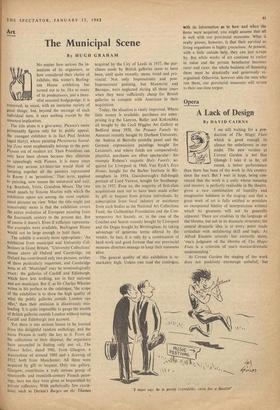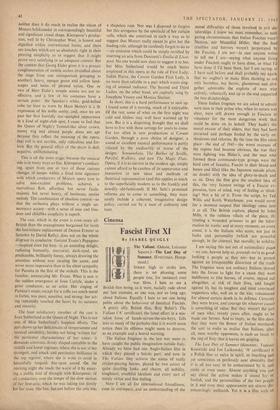Opera
A Lack of Design
By DAVID CAIRNS
I AM still waiting for a pro- duction of The Magic Flute which is good enough to silence the unbelievers in our midst. The new version at Covent Garden is not that (though I take it to be, all round, a better performance than there has been of the work in this country since the war). But I wait in hope, being con- vinced that the work is a unity whose meaning and mystery is perfectly realisable in the theatre, given a rare combination of humility and imaginative boldness in the staging; and that a great work of art is fully entitled to postulate an exceptional fidelity of interpretation without which its greatness will not be generally apparent. There are crudities in the language of the libretto, but not in its dramatic structure; the central dramatic idea is at every point made articulate with unfaltering skill and logic. As Alfred Einstein severely but correctly states, 'one's judgment of the libretto of The Magic Flute is a criterion of one's musico-dramatic understanding.'
At Covent Garden the staging of the work does not positively encourage unbelief, but
must say, he is pretty incredible, even for a flautist!'
neither does it do much to realise the vision of Mozart-Schikaneder in correspondingly beautiful and significant visual shape. Klemperer's produc- tion, well lit by Christopher West, is honest and dignified within conventional limits; and there are touches which are so absolutely right in their piercing simplicity as to suggest that it might prove very satisfying in an adequate context. But the context that Georg Eisler gives it is a prosaic conglomeration of mobile arches (trundled about the stage from one unimportant grouping to another), heavy, opaque green and yellow land- scapes and bales of pleated nylon. One or two of Herr Eisler's temple scenes are not in- effective, and a few of his costumes have a certain point : the Speaker's white, gold-belted robe (at least as worn by Hans Hotter) is a fit expression of his noble sanity; and, once we are past her first horridly star-spangled appearance in a kind of night-club spot, I came to feel that the Queen or Night's Tenniel-like silver crown, snowy wig and absurd purple dress are apt because they reflect the meaning of the opera, that evil is not terrible, only ridiculous and for- lorn. But the general effect of the decor is dull, negative, unilluminating.
This is all the more tragic because the musical side is in many ways so fine. Klemperer's conduct- ing, apart from one or two of those curious changes of tempo within a fixed time signature with which conductors of Mozart opera love to solve non-existent problems, achieves a marvellous flow, effortless but never facile, majestic but never heavy, of luminous, serene melody. The combination of absolute control—so that the orchestra plays without a single un- necessary accent—with a sense of ease and free- dom and childlike simplicity is superb.
The cast, which in the event is even more all- British than the management bargained for (with the last-minute replacement of Dersoe Ernster as Sarastro by David Kelly), does not on the whole disgrace its conductor. Geraint Evans's Papageno —inspired even for him—is an unending delight, radiating humanity, mercurial, dark-eyed, un- predictable, brilliantly funny, always drawing the attention without ever stealing the scene, and never more impressive than in his silent sympathy for Pamina in the first of the ordeals. This is the familiar, unwearying Mr. Evans. What is new is the sudden emergence of Joan Carlyle, under a great conductor, as an artist. Her singing of Pamina's music, except for a trifle too much metal in fortes, was pure, sensitive, and strong; her act- ing repeatedly touched the heart by its sureness and sincerity.
The least satisfactory member of the cast is Joan Sutherland as the Queen of Night. This is not one of Miss Sutherland's happiest efforts. The part shows up her deficiencies of temperament and musical sensibility, besides not being 'written for' the particular characteristics of her voice : it demands sonorous, firmly shaped cantabile in the middle and lower registers, where she is not at her strongest, and attack and percussive brilliance in the top register; where she is wont to revel in beautifully languid, fine-spun sound. On the opening night she made the worst of it by essay- ing a public trial of strength with Klemperer, of all conductors, over the tempo of the slow section of her first aria, which he was taking too slowly for her taste. She lost, but not before the aria was a shapeless ruin. Nor was I disposed to forgive her this arrogance by the spectacle of her curtain calls, which she contrived in such a way as to suggest that Mozart really meant to give her the leading role, although he carelessly forgot to do so —an omission which could be simply rectified by inserting an aria from Donizetti's Emilia di Liver- pool. No one would now dare to suggest it to her, but Miss Sutherland would be much better employed in this opera in the role of First Lady; Judith Pierce, the Covent Garden First Lady, is no more than reliable in a part which wants sing- ing, of unusual radiance. The Second and Third Ladies, on the other hand, are ,capitally sung by Josephine Veasey and Monica Sinclair.
In short, this is a hard performance to sum up. I found some of it moving, much of it enjoyable. Of the rest, some of what on the first night was cold and lifeless may well have warmed .up by now. But it is a dispiriting thought that we shall have to live with those settings for years to come. Far too often in new productions at Covent Garden, through a poor choice of designer, a sound or excellent musical performance is partly vitiated by the mediocrity or worse of the designs : Sonnambula, The Barber of Seville, Parsifal, Walk fire, and now The Magic Flute. Opera, if it is to survive in the modern age, simply cannot afford to be• careless of its appearance and insensitive to new ideas and methods of theatrical representation (and this applies as much to the superficially modern as to the frankly and dowdily old-fashioned). If Mr. Solti's promised reforms are to come to something, they must surely include a coherent, imaginative design policy, carried out by a man of authority and taste.































 Previous page
Previous page